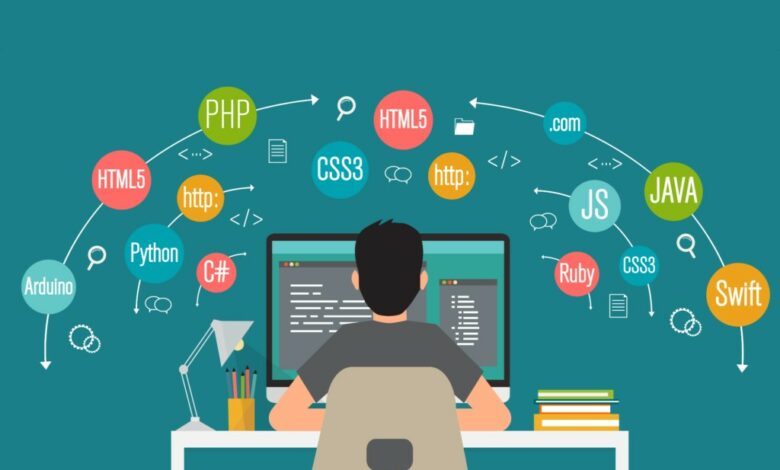
Table of Content
There has been a growing acceptance of coding bootcamps as effective training programs for software engineers and web developers. A few years back, a computer science degree used to be the sole pathway into the technology sector. However, in the modern era, intelligent industries now acknowledge the significance of bootcamps.
While choosing a coding bootcamp, several factors should be considered, such as the learning format, financing options, and career support services. Moreover, thorough research of success stories of boot camp alumni is required to understand the application process. This will help you to make an informed decision and choose a bootcamp that aligns with your goals and learning style.
To make your decision easy and efficient, this article will highlight the top 10 coding bootcamps. We tested these bootcamps on factors such as curriculum, instructor quality, and job placement rates. It will also provide an overview of what to look for in a coding bootcamp and tips for financing your education. Whether you’re a recent graduate or a career changer, this article will guide you to finding the best coding bootcamp.
Read Also: How to Install a Bootable Windows 11 Through USB Drive
Key Takeaways
- When choosing a coding bootcamp, it’s essential to consider factors such as learning format, financing options, and career support services.
- The top 10 coding bootcamps are ranked based on factors such as curriculum, instructor quality, and job placement rates.
- Researching alumni success stories and understanding the application process can help you make an informed decision when choosing a coding bootcamp.
What to Look for in a Coding Bootcamp
When looking for a coding bootcamp, it is essential to consider several factors that will impact the quality of education and the likelihood of success in the tech industry. Here are some key aspects to consider:
Curriculum Relevance
The curriculum of a coding bootcamp should be relevant to the current state of the tech industry. Look for a bootcamp that teaches the most in-demand programming languages, frameworks, and tools. Additionally, ensure the curriculum covers the entire software development process, including design, testing, and deployment.
Job Placement Rate
A high job placement rate is a good indicator of the quality of a coding bootcamp. Look for bootcamps that have a job placement rate of at least 80%. It is also essential to research the types of jobs that graduates are getting and the companies they are working for.
Industry Connections
A coding bootcamp with solid industry connections can provide valuable networking opportunities and access to job openings. Look for bootcamps that have partnerships with tech companies, offer mentorship programs, or host career fairs.
Top 10 Coding Bootcamps
1. General Assembly
- Price: $15,950; pay upfront, income share agreements,
- Facilities: Instalment payment plans, loans, and tuition discounts available
- Methodology: Online and On-campus classes in Asia, Australia, Europe, or North America With Fulltime and Part Time Classes
- Course Duration: 10-24 weeks
- Curriculum: JavaScript, React, Python, Django, Git, and GitHub
General Assembly is one of the most well-known and top-choice coding bootcamps in the field. They offer full-time as well as part-time courses in web development, data science, and UX design. Their immersive programs are highly regarded and have helped many students transition into new careers. General Assembly also has a robust alumni network and offers career services to help graduates find jobs. The course is divided into different units.
- Unit1: Learn front-end development
- Unit2: Full Stack Development
- Unit3: Frontend FrameWork
- Unit4: API’s and Full stack development
Pros:
- On-campus and Online Classes
- Suitable for beginners
- Authorized Certificates Awarded
2. Hack Reactor
- Price: $17,980;
- Facilities: Pay upfront, income share, split-payments, loans, scholarships, and veterans benefits available
- Methodology: Online class. Students can join full-time and part-time as well.
- Course Duration: 12-36 weeks
- Curriculum: React, ES6, and full-stack JavaScript
Hack Reactor is a rigorous coding bootcamp that focuses on full-stack JavaScript development. Their curriculum is designed to prepare students for jobs as software engineers. Hack Reactor also offers career services to help graduates find jobs. They have a high job placement rate, and their alumni work at top tech companies such as Google, Amazon, and Microsoft.
A non-technical assessment test called the Criteria Cognitive Aptitude Test (CCAT) and two technical assessment tests are required to be cleared for admission to Hack Reactor.
Pros
- The beginners can join a separate program.
- Online support is available for the students.
3. App Academy
- Price: $17,000-$31,000.
- Facilities: Pay upfront, deferred, and instalment payment plans available
- Methodology: Students can join classes online or visit campus in New York City or San Francisco. Moreover, Full-time, part-time, or self-paced offer is also available
- Course Duration: 16 or 24 weeks
- Curriculum: JavaScript, Python, SQL, HTML, CSS, ReactJS, Express, Flask, and SQL Alchemy
App Academy is a coding bootcamp that offers a deferred tuition model. Students only pay tuition if they secure a job after completing the program. Their curriculum focuses on full-stack web development, and their program is highly selective. App Academy has a high job placement rate, and its alumni work at top tech companies such as Google, Facebook, and Airbnb.
The app academy courses delve into a wide range of subjects, such as algorithms, object-oriented programs, full-stack apps, and front-end applications. Enrollees create portfolios through a variety of projects, including individual, group, and partner collaborations. The admission process may involve a 25-minute technical assessment, a 60-minute coding challenge, a technical interview, and a non-technical interview
4. Flatiron School
- Price: $16,900;
- Facilities: Pay upfront or instalment payment plans available
- Methodology: Students can join classes online or visit campuses in New York City or Denver. Moreover, Full-time, part-time, or self-paced offer is also available
- Course Duration: 15 or 40 weeks
Flatiron School is a well-renowned name in the tech industry. This school offers courses in software engineering, data science, and UX/UI design. Their immersive programs are highly regarded and have helped many students transition into new careers. Flatiron School also has a robust alumni network and offers career services to help graduates find jobs.
To get admission here, students have to pass the non-technical interview and a 15-minute assessment that evaluates critical thinking and problem-solving abilities. Accepted students are required to complete 40 hours of preparatory lessons and labs before the start of the academic term.
5. The Fullstack Academy
- Price: For Full-time students, $18,910 and $17,480 for part-time students.
- Facilities: Pay upfront, employer assistance, government assistance, scholarships, and loans available
- Methodology: Students can join classes online or visit campuses in New York City.
- Course Duration: 17-28 weeks
- Curriculum: HTML, CSS, JavaScript, Git, Github, Bash, Sublime, and Chrome development tools
The fullstackAcademy is a coding bootcamp that offers courses in web development, software development, and data science. Their curriculum is self-paced and flexible, allowing students to learn at their own pace. The Tech Academy also offers career services to help graduates find jobs. They have a high job placement rate, and their alumni work at top tech companies such as Amazon, Microsoft, and Intel.
The course is divided into two phases:
- Phase one: The fundamental concepts of CSS, HTML, and JavaScript.
- Phase two: Focuses on programming and web development concepts.
- Phase three: This entails collaborating with a career coach. Students engage in the creation of apps for their portfolios and collaborate on pair programming projects.
The admission process involves a 30-minute coding assessment and a 60-minute behavioural and technical interview. Applicants are limited to two attempts for acceptance. The admission process involves a non-technical interview and a 15-minute assessment that evaluates critical thinking and problem-solving abilities. Admitted students are required to complete 40 hours of preparatory lessons and labs before the first day of class.
6. Coding Dojo
- Fee: For full-time students, $14,995-$16,495; for part-time students, $7,495-$8,995.
- Facilities: Pay upfront, instalment payment plans, income share agreements, loans, and scholarships available
- Methodology: Students can join classes online or visit campuses in Bellevue, Los Angeles, or Silicon Valley as full-time, part-time, or self-paced students.
- Course Duration: 14-32 weeks
- Curriculum: HTML, CSS, JavaScript, Jquery, Flask, and React
Coding Dojo is a coding bootcamp that offers courses in web development, data science, and software development. Their curriculum is designed to prepare students for jobs as software engineers. Coding Dojo also offers career services to help graduates find jobs. They have a high job placement rate, and their alumni work at top tech companies such as Apple, Microsoft, and Google.
Coding Dojo provides extensive career services for its graduates, ensuring long-term professional support. The bootcamp proudly shares that an impressive 84% of graduates successfully secured a job that aligns with their field of study within 180 days. Admission necessitates the completion of an application and a conversation with an admission advisor. Applicants will be notified of their acceptance within a span of two to three days.
7. Bloc
Bloc is an online coding bootcamp that offers courses in web development, mobile development, and design. Their curriculum is self-paced and flexible, allowing students to learn at their own pace. Bloc also offers career services to help graduates find jobs. They have a high job placement rate, and their alumni work at top tech companies such as Apple, Tesla, and IBM.
8. Ironhack
Ironhack is a coding bootcamp that offers courses in web development, UX/UI design, and data analytics. Their immersive programs are highly regarded and have helped many students transition into new careers. Ironhack also has a robust alumni network and offers career services to help graduates find jobs. They have a high job placement rate, and their alumni work at top tech companies such as Google, Uber, and Visa.
9. Thinkful
Thinkful is a coding bootcamp that offers courses in software engineering, data science, and UX/UI design. Their curriculum is self-paced and flexible, allowing students to learn at their own pace. Thinkful also offers career services to help graduates find jobs. They have a high job placement rate, and their alumni work at top tech companies such as Google, IBM, and Amazon.
10. Le Wagon
Le Wagon is a coding bootcamp that offers courses in web development and data science. Their immersive programs are highly regarded and have helped many students transition into new careers. Le Wagon also has a robust alumni network and offers career services to help graduates find jobs. They have a high job placement rate, and their alumni work at top tech companies such as Google, Airbnb, and Uber.
Bootcamp Learning Formats
Online vs In-Person
When it comes to coding bootcamps, one of the biggest decisions students have to make is whether to attend in-person or online. In-person bootcamps offer the benefit of face-to-face interaction with instructors and peers, which can be invaluable for some learners. However, online bootcamps offer the flexibility to learn from anywhere and at any time, making them a great option for those with busy schedules or who live far from the nearest in-person bootcamp.
Full-Time vs Part-Time
Another important consideration when choosing a coding bootcamp is whether to attend full-time or part-time. Full-time bootcamps typically last anywhere from 12 to 16 weeks and require a significant time commitment, while part-time bootcamps can take anywhere from 6 to 24 months to complete. Full-time bootcamps are great for those who want to immerse themselves in coding and complete their training quickly, while part-time bootcamps are better suited for those who need to balance their studies with work or other commitments.
Self-Paced Learning
For those who need even more flexibility, self-paced learning is a great option. Self-paced bootcamps allow students to complete coursework on their own schedule, without the need to attend live lectures or adhere to a strict timeline. This format is great for those who need to work around other commitments or who want to take their time with the material. However, it’s important to note that self-paced learning requires a high degree of self-motivation and discipline, as there is no set schedule or deadlines to keep students on track.
Financing Your Education
When it comes to financing a coding bootcamp, there are a few options available to students. In this section, we will explore the three most common ways to pay for a coding bootcamp: upfront tuition, income share agreements, and scholarships and grants.
Upfront Tuition
The most straightforward way to pay for a coding bootcamp is to pay the full tuition upfront. This option is ideal for students who have the financial means to do so. Some bootcamps offer discounts for students who pay upfront, so it’s worth asking about this option when researching bootcamps.
Income share agreements (ISAs) are becoming an increasingly popular way to finance a coding bootcamp. With an ISA, the student agrees to pay a percentage of their income for a set period of time after they graduate and start working in the tech industry. This option is ideal for students who cannot afford to pay upfront tuition but are confident they will secure a job after graduation.
Scholarships and Grants
Many coding bootcamps offer scholarships and grants to students who meet certain criteria. Scholarships and grants can cover some or all of the tuition costs, making bootcamps more accessible to students who may not have the financial means to pay upfront or participate in an ISA. Students should research the different types of scholarships and grants available and ensure they meet the eligibility requirements before applying.
Career Support Services
When choosing a coding bootcamp, it is important to consider the career support services that are offered. The best bootcamps provide students with the necessary tools and resources to succeed in their job search. Here are the top career support services to look for in a coding bootcamp:
Mentorship
Mentorship is an essential part of any coding bootcamp’s career support services. A good mentor can provide guidance, advice, and support throughout the job search process. The best bootcamps offer one-on-one mentorship with experienced professionals in the tech industry. This allows students to receive personalized feedback and support as they navigate their job search.
Career Coaching
Career coaching is another important aspect of career support services. Bootcamps should offer career coaches who can provide students with guidance on job searching strategies, resume writing, and interview skills. The best bootcamps offer ongoing coaching throughout the job search process, ensuring that students have the support they need to land their dream job.
Interview Preparation
Interview preparation is crucial for success in the job search process. The best bootcamps offer interview preparation workshops and mock interviews to help students prepare for the real thing. These workshops should cover common interview questions, coding challenges, and behavioural questions. Additionally, bootcamps should provide students with feedback on their performance to help them improve their skills.
Bootcamp Alumni Success Stories
One of the most important factors to consider when choosing a coding bootcamp is the success rate of its graduates. Here are a few success stories from alumni of the top coding bootcamps:
1. Hack Reactor
Hack Reactor alumni have gone on to work at top tech companies like Google, Twitter, and LinkedIn. One standout success story is that of Elizabeth Ferrao, who graduated from Hack Reactor and went on to become a software engineer at Airbnb.
2. App Academy
App Academy boasts an impressive job placement rate of 98%. One of their success stories is that of Alex Karpman, who graduated from App Academy and landed a job as a software engineer at Facebook.
3. General Assembly
General Assembly has a network of over 40,000 alumni, many of whom have gone on to work at top companies like Google, Amazon, and Microsoft. One success story is that of Tomer Elmalem, who graduated from the General Assembly and landed a job as a software engineer at Spotify.
4. Flatiron School
Flatiron School has an alumni network of over 2,000 graduates who have gone on to work at companies like Etsy, Kickstarter, and Microsoft. One success story is that of Rachel Ralston, who graduated from Flatiron School and landed a job as a software engineer at Google.
5. Fullstack Academy
Fullstack Academy has an impressive job placement rate of 97%. One success story is that of Annie Zhang, who graduated from Fullstack Academy and landed a job as a software engineer at Amazon.
These success stories are just a few examples of the many alumni who have found success after attending a top coding bootcamp.
How to Apply to Bootcamps
Application Process
The application process for coding bootcamps varies from program to program, but most require applicants to fill out an online application form and submit it along with a resume and a personal statement. Some bootcamps may also require applicants to complete a coding challenge or take a technical assessment.
Applicants should carefully review the application requirements and deadlines for each bootcamp before applying. They should also take the time to research each program to ensure that it aligns with their career goals and learning styles.
Interview Preparation
Many bootcamps require applicants to participate in an interview as part of the application process. The interview may be conducted in person, over the phone, or via video conferencing.
To prepare for the interview, applicants should research the bootcamp and be prepared to discuss their coding experience, career goals, and motivation for attending the program. It’s also a good idea to practice coding problems and be familiar with common coding concepts and terminology.
Pre-Bootcamp Studies
Some bootcamps require applicants to complete pre-boot camp studies before starting the program. These studies may include online courses or tutorials designed to help students build a foundation in coding and prepare for the rigors of the bootcamp.
Applicants should carefully review the pre-bootcamp studies requirements and ensure that they have the time and resources to complete them before the bootcamp begins. It’s also important to take advantage of any resources or support offered by the bootcamp to help prepare for the program.
Bootcamp vs Traditional Computer Science Degrees
When deciding between attending a coding bootcamp or pursuing a traditional computer science degree, one must consider their career goals, learning style, and time and financial constraints.
Bootcamps typically offer a shorter and more intensive curriculum focused on practical skills and hands-on experience. This can be beneficial for those looking to quickly gain technical skills in a specific area and enter the workforce. However, bootcamps may not provide as comprehensive of an education as a four-year computer science degree, which covers a broader range of topics and includes theoretical foundations.
Traditional computer science degrees offer a more well-rounded education, including courses in mathematics, algorithms, and software engineering. This can be advantageous for those interested in pursuing research or advanced technical positions. However, the longer duration and higher cost of a degree program may not be feasible for everyone.
Both options can lead to successful careers in tech, and ultimately the decision should be based on individual circumstances and goals.
| Bootcamp | Traditional Computer Science Degree |
|---|---|
| Shorter duration | Longer duration |
| Focused on practical skills | Comprehensive education |
| Lower cost | Higher cost |
| May not cover theoretical foundations | Covers a broader range of topics |
| Good for quick entry into the workforce | Good for research or advanced technical positions |
Continued Learning After Bootcamp
Upon completing a coding bootcamp, graduates are equipped with the necessary skills to enter the tech industry. However, the learning does not stop there. Many bootcamps offer continued learning opportunities to help graduates stay up-to-date with the latest technologies and industry trends.
Advanced Courses
Some coding bootcamps offer advanced courses for graduates who want to further their education. These courses are designed to help graduates deepen their knowledge and skills in specific areas such as data science, cybersecurity, or mobile app development.
These advanced courses are usually shorter than the bootcamp itself, ranging from a few weeks to a few months. Graduates can choose to take these courses online or in person, depending on their preferences and schedules.
Networking Opportunities
Networking is a crucial part of any career, and the tech industry is no exception. Many coding bootcamps offer networking opportunities for their graduates to connect with industry professionals, potential employers, and fellow alumni.
These networking events can take many forms, such as meetups, job fairs, or mentorship programs. Graduates can use these events to expand their professional network, learn about job opportunities, and get advice from experienced professionals.
Continued learning after bootcamp is essential for graduates who want to stay competitive in the tech industry. Advanced courses and networking opportunities offered by coding bootcamps can help graduates deepen their knowledge, expand their professional network, and stay up-to-date with the latest industry trends.




